CIA Sponsored Terror, Civil Liberties, Criminalizing Dissent, Guantanamo, Habeas Corpus, Human Rights, Iraq War, Political Prisoner, Supreme Court, Surveillance, Targeting Muslims, Torture, Truth to Power
Podcast: Play in new window | Download
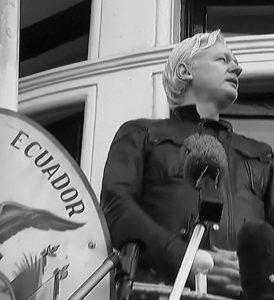

Misuse of Grand Juries And The Prosecution Of Chelsea Manning
The Trump administration wants to prosecute the news organization Wikileaks and its founder Julian Assange. In order to do so they have recently jailed whistleblower Chelsea Manning, who has been in solitary confinement since March 8th, 2019 in hopes to squeeze her to get testimony that could be used against Assange. Prolonged solitary confinement is a form of torture.
Chelsea Manning has refused to answer questions of the Government Prosecutor in front of a grand jury. In 2010 Chelsea Manning, then in the Army, released documents to WikiLeaks known as the Iraq War Logs. One of them was a video showing a U.S. Apache attack helicopter killing 12 people, including two Reuters journalists, two children and a passerby who stopped his van to rescue the wounded. She maintains that there’s nothing new to be learned and that she’s already given full testimony.
Chelsea Manning was convicted and served 7 years of a 35 year sentence before her sentence was commuted by Barack Obama. The prosecution of WikiLeaks for accepting leaked secret documents is a threat to press freedom and would criminalize journalism. The government is trying to frame Assange charging him with actively colluding with Manning, not just being a passive recipient of the leak. Historically grand juries have been misused in order to suppress political dissent.
Write to Chelsea Manning in solitary confinement:
Chelsea Manning
Ao181426
William G. Truesdale Adult Detention Center
2001 Mill Rd.
Alexandria, VA 22314
Guest – Attorney Michael Deutsch, an expert on the misuse of grand juries. He is a partner in the Chicago law firm The People’s Law Office and a former director of litigation at the Center for Constitutional Rights. He has represented political activists and victims of government repression. Among his clients have been the Attica prisoners in the 1971 uprising, Puerto Rican independence fighters, members of the black liberation movement, grand jury resistors, and Palestinians falsely accused of terrorism.
—-
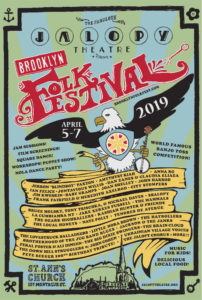
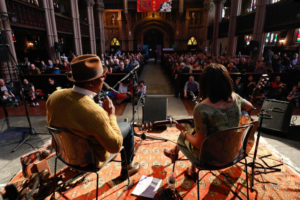
The Brooklyn Folk Festival April 2019
In the political radicalizations and social upheaval’s within the United States of America in the 30s and again in the 60s, we saw an increased interest in folk music. This phenomenon is repeating itself today. We speak today with Eli Smith, the producer of the Brooklyn Folk Festival. He is a banjo player, a folklorist, and a member of the string band The Downhill Strugglers. The Brooklyn Folk Festival is the largest of its type in the country and is now in its 11th year. It takes place in Brooklyn Heights at the historic Saint Ann’s Church this April.
Guest – Eli Smith, a musician, producer and activist from Brooklyn, who has helped organize the event. Eli Smith is also a folklorist and music producer who organizes the annual “Brooklyn Folk Festival.”
—-
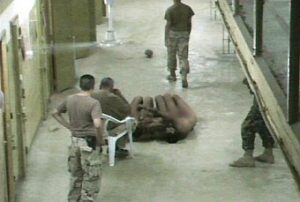
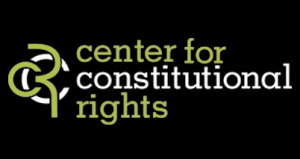
U.S. Appeals Court Opens Abu Ghraib Prison Abuse Case
In 2016, the United States appeals court re-instituted the Abu Ghraib prison abuse case against a private military contractor CACI. Since that time, the plaintiffs have had multiple victories.
The Center for Constitutional Rights is representing the abused prisoners. CCR‘s legal director Baher Azmy said “There is no question that torture is unlawful under domestic, military, and international law. The only issue in this case is whether CACI Will be held accountable – or treated with impunity – for its role in torture at Abu Ghraib. Now, the case is set for trial in Alexandria, Virginia on April 23.
Guest – Attorney Katherine Gallagher filed the case nearly 11 years ago and she is a Senior Staff Attorney at the Center for Constitutional Rights. Katherine works on universal jurisdiction and international criminal law cases involving U.S. and foreign officials and torture and other war crimes, and cases involving private military corporations and torture at Abu Ghraib. Her major cases include Al Shimari v. CACI, the international U.S. torture accountability cases, and Survivors Network of those Abused by Priests (SNAP) v. Vatican, seeking accountability for the crimes against humanity of sexual violence by clergy and cover-up.
———————

———————
CIA Sponsored Terror, Civil Liberties, Criminalizing Dissent, Human Rights, Political Prisoner, Prison Industry, Supreme Court, Surveillance, Targeting Muslims, Torture, Truth to Power, War Resister
Podcast: Play in new window | Download

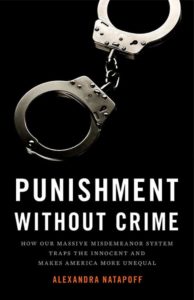
Punishment Without Crime: How Our Massive Misdemeanor System Traps the Innocent and Makes America More Unequal
In the overburdened U.S. criminal justice system, with its burgeoning prison population, we hear a lot about felony convictions. Felonies are crimes usually punishable by a term of more than one year, or the death penalty. What we don’t hear much about are misdemeanors, low level offenses punishable by fines or short terms of imprisonment in local jails.
With ten million petty cases filed annually, most U.S. convictions are misdemeanors. Unlike felonies, however, their processing is typically informal and deregulated. Much like fast-food justice, they have high-volume arrests, weak prosecutorial screening, an overtaxed defense bar, and high plea rates. There is often little meaningful scrutiny to see if convictions are supported by evidence. Innocent people who can’t afford bail often plead guilty just to get out of jail.
What the result of misdemeanor convictions? It’s pretty serious: stigma of a criminal record, misdemeanants are often heavily fined, incarcerated, and/or lose jobs, housing, and educational opportunities. Petty convictions are more frequent and burdensome even as we devote fewer institutional resources to ensuring their validity.
The misdemeanor phenomenon has profound systemic implications. It invites skepticism about whether thousands of individual misdemeanants are actually guilty. It reveals an important structural feature of the criminal system: that due process and rule-of-law wane at the bottom of the penal pyramid where offenses are pettiest and defendants are poorest. Misdemeanor processing is the way poor defendants of color are swept up into the criminal system with little or no regard for actual guilt.
In her new book, Punishment Without Crime: How Our Massive Misdemeanor System Traps the Innocent and Makes America More Unequal, Law Professor Alexandra Natapoff takes an in-depth look at the misdemeanor process is an institutional gateway that explains many of the criminal system’s dynamics and dysfunctions.
Guest – Alexandra Napatoff, University of California Irvine law professor and a member of the American Law Institute. She’s also a former federal public defender, a community organizer, and the recipient of an Open Society Institute Community Fellowship.
—-
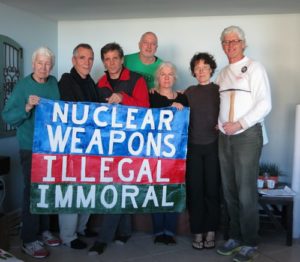
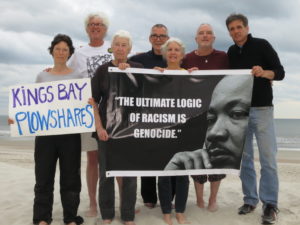
Kings Bay Plowshares 7
In our society nuclear weapons that can destroy all creation are taken as a normal, even an inevitable, part of life. In a dramatic action to break what they call “the crime of silence“ seven Catholic peace activists entered the Kings Bay trident submarine base in Georgia last April to perform an act of symbolic disarmament.
They used hammers to follow the prophecy of Isaiah “to beat swords into plowshares” and poured blood to make holy what was evil in a sacramental action.
Kings Bay is homeport to six ballistic missile trident submarines, each of which deploy 16 trident missile’s carrying four or more warheads of at least 100 kilotons. The Hiroshima bomb was 14 kilotons. Each submarine thus has the distructive power of at least 500 Hiroshima bombs.
The plowshares seven face up to 25 years in federal prison. Their trial is coming up in the next month. Theirs was the latest of 100 plowshares actions around the world since 1980.
Guest – Martha Hennessey, Kings Bay Plowshares 7 co-defendant, activist and volunteer with the New York Catholic Worker.
Guest – Carmen Trotta, Kings Bay Plowshares 7 co-defendant, activist and volunteer with the New York Catholic Worker.
——————

——————
CIA Sponsored Terror, Civil Liberties, Habeas Corpus, Human Rights, Supreme Court, Truth to Power
Podcast: Play in new window | Download
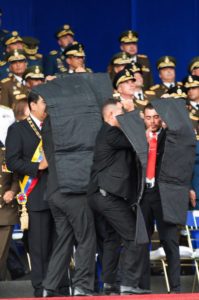
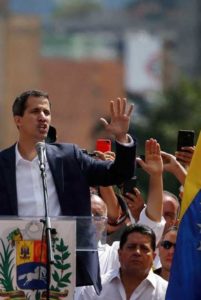
Venezuela Coup d’Etat
The last coup d’état the United States of America sponsored in 2009 in Latin America was under the Obama administration and supported by his Secretary of State Hillary Clinton when they overthrew a mildly social democratic president of Honduras. At that time the USA denied its role.
Today we are witnessing a quite open and blatant coup d’état in oil rich Venezuela against their recently and democratically elected socialist president Nicolas Maduro. The US boldly announced it no longer considered Maduro the legitimate president of his country.
In his stead the USA has recognized Jose Guida, an obscure legislator from the most right wing of the opposition parties after Vice President Mike Pence called him on the phone and gave him the blessings of United States government.
Venezuelan oil assets in the United States which amount to over $7 billion have been frozen. Likewise it’s $1 billion plus bank deposits in the United Kingdom have been seized. The United States has succeeded, in the infamous words of former Secretary of State Henry Kissinger, who engineered the coup against the elected Democratic Socialist President Salvador Allende in Chile on September 11 of 1973, “ to make their economy scream”.
The Venezuelan economy is now half its former size and hobbling along at a depression level. Food and medicine there is increasingly scarce. Tens of thousands of people have been forced to leave their country. Nevertheless, President Maduro has retained popular support including the support of the Venezuelan army.
Guest – Greg Grandin, a professor of history at New York University and a Nation editorial board member, is the author of a number of prize-winning books, including The Empire of Necessity, which won the Bancroft Prize; Fordlandia, which was a finalist for the Pulitzer Prize, the National Book Award, and the National Book Critics Circle Award; Empire’s Workshop; The Last Colonial Massacre; The Blood of Guatemala; and, most recently, Kissinger’s Shadow: The Long Reach of America’s Most Controversial Statesman. His new book, forthcoming this spring, is The End of the Myth: From the Frontier to the Border Wall in the Mind of America.
—-

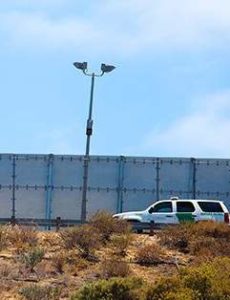
United States Executive Authority in Declaring Emergency Powers
U.S. presidents have the discretion to declare a “national emergency.” As soon as he does, he can sidestep many existing limits to presidential authority. In fact, 100 or more special provisions become available to him. Some provide reasonable responses to real emergencies, while others seem to bolster the power of a so-called unitary executive who wants to amassing or retain power. The president can activate laws allowing him to, for example, shut down many kinds of electronic communications inside the U.S. or to freeze Americans’ bank accounts. Other powers are available without a declaration of emergency, including laws that allow the president to deploy troops inside the country to subdue domestic unrest.
The rationale for having emergency powers is simple: The government’s ordinary powers may not be enough in times of crisis, and amending the laws to provide greater ones would take too long. Emergency powers are intended to give a temporary boost until the emergency passes or there is time to change the law through the regular legislative process. The problem comes when presidents don’t have the best interest of the country in mind.
Guest – Andrew Boyd, Counsel in the Brennan Center’s Liberty and National Security Program. Andrew spent 7 years prosecuting senior Khmer Rouge leaders on behalf of the UN for war crimes, crimes against humanity and genocide. He also worked on cases resulting from the 1994 Rwandan genocide at the International Criminal Tribunal for Rwanda.
———–

———–
CIA Sponsored Terror, Civil Liberties, Criminalizing Dissent, FBI Intrusion, Human Rights, Political Prisoner, Prison Industry, Supreme Court, Surveillance, Truth to Power, War Resister
Podcast: Play in new window | Download
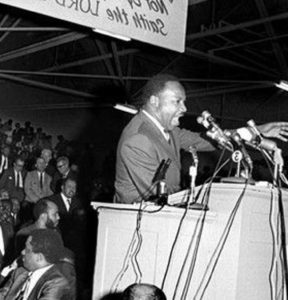
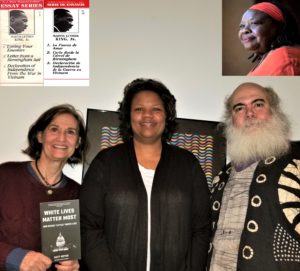
Honoring the Legacy Of Dr. Martin Luther King Jr.
Today on Law and Disorder we bring you a special hour-long program honoring the life and legacy of the Rev. Dr. Martin Luther King. Our listeners know all too well that the Nobel Peace Prize laureate was shot on April 4, 1968–51 years ago. Not so well known is the radical Dr. King, who said in the last months of his life that:
“Our only hope today lies in our ability to recapture the revolutionary spirit and go out into a sometimes hostile world, declaring eternal hostility to poverty, racism, and militarism. With this powerful commitment we shall boldly challenge the status quo.”
Joining us are special guests Ruby Sales, a colleague of Dr. King’s and co-founder of the Student Nonviolent Coordinating Committee; and Rev. Dr. Emma Jordan-Simpson, Executive Director of the Fellowship of Reconciliation (F.O.R.). We’re also joined by author and activist Matt Meyer, a board member of the AJMI.
Dr. King began close ties with A.J. Muste and with the F.O.R. during the Montgomery bus boycott, when FOR staff members Bayard Rustin and Glenn Smiley came to Alabama to support local efforts nonviolently challenging racial segregation. Dr. King developed a special relationship with former FOR chairman A.J. Muste, whose absolute pacifism King had, as a theological seminary student, questioned.
Before heading F.O.R., Muste was a prominent labor leader, helping to found the militant Congress of Industrial Organizations (CIO). And Dr. King, of course, was killed exactly one year after taking a staunch anti-Vietnam war position and in the midst of supporting a significant strike of sanitation workers, linking—as he had been—issues of race, class, and violence as King deepened his critique of the roots of oppressive U.S. society.
Guest – Ruby Sales is the founder and director of the “SpiritHouse Project”, a national organization that uses the arts, research, education, action and spirituality to bring diverse peoples together to work for racial, economic and social justice as well as for spiritual maturity. A life-long organizer, scholar and public theologian in the areas of civil, gender and other human rights, she was a member of the Student Non-violent Coordinating Committee and served as national convener of the Make Every Church A Peace Church movement.
Guest – Rev. Dr. Emma Jordan-Simpson is the Executive Pastor of The Concord Baptist Church of Christ, Brooklyn, NY. She has combined pastoral ministry with the social justice community. The former Executive Director of the Children’s Defense Fund she is now the Executive Director of the Fellowship of Reconciliation.
Guest – Matt Meyer is Secretary-General of the International Peace Research Association, Chair of the International Fellowship of Reconciliation’s Financial Advisory Committee, Africa Support Network Coordinator of the War Resisters International, and Senior Research Scholar at U-Mass Amherst. As current National co-chair of FOR and former Chair of the War Resisters League, he is second only to AJ Muste in holding the top post of those two historic US peace organizations. He is author of the recently published White Lives Matter Most And Other “Little” White Lies.
———-

———-
Civil Liberties, Death Penalty, Human Rights, Political Prisoner, Supreme Court, Truth to Power, War Resister
Podcast: Play in new window | Download
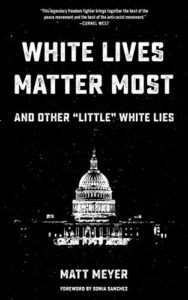
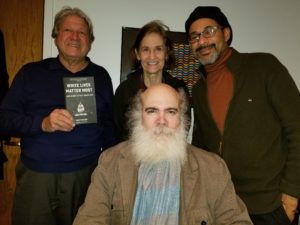
White Lives Matter Most And Other “Little” White Lies
In a society in which entrenched racism persists, is it possible for white activists to meaningfully engage in anti-racist movements such as the movement for black lives?
Longtime peace activist, educator and author Matt Meyer examines that question in his new book White Lives Matter Most And Other “Little” White Lies. As we honor the life and legacy of Reverend Dr. Martin Luther King Jr. we talk with Matt Meyer of whom Cornell West says “this legendary freedom fighter brings together the best of the peace movement and the best of the anti-racism movement. “
Guest – Matt Meyer is the International Peace Research Association representative at the United Nations, the national co-chair of the Fellowship of Reconciliation, and the War Resisters’ International Africa Support Network Coordinator. A noted educator, author, and organizer, Meyer focuses on an extensive range of human rights issues including support for political prisoners; solidarity with Puerto Rico, the Black Liberation movement and all decolonization movements; and bringing an end to patriarchy, militarism, and imperialism.
—-
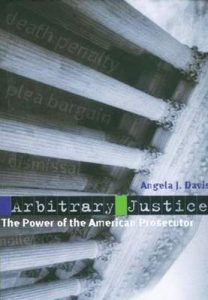
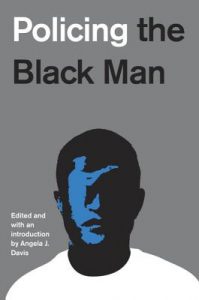
Attorney Angela Davis: Arbitrary Justice
“In the halls of justice”, it has been quipped, “the only justice you find is in the halls.” H. Rap Brown, a leader of SNCC, the Student Non-violent Coordinating Committee, said that justice in America means “just us”. There are 2.3 million people in American prisons today. A great proportion of them are African-Americans. If you assume Europe has the same social situation that we do in America, it is a telling fact that we have seven times as many prisoners. Part of the explanation for this phenomenon, In addition to the racist nature of the United States of America, is the power that the American prosecutor has. It is the power to choose whom to prosecute and for what crime. It is the power to obtain convictions, not to seek justice. It is a power that is discretionary and open to abuse. This abuse is rarely reviewable or punished.
Guest – Attorney and Professor Angela J. Davis author of Arbitrary Justice: The Power of the American Prosecutor. Her most recent book “Policing the Black Man” covers the key issues of the Black Lives Matter movement. Angela J. Davis, professor of law at American University Washington College of Law, is an expert in criminal law and procedure with a specific focus on prosecutorial power and racism in the criminal justice system. Davis previously served as director of the D.C. Public Defender Service, where she began as a staff attorney representing indigent juveniles and adults. She also served as executive director of the National Rainbow Coalition and is a former law clerk of the Honorable Theodore R. Newman, the former Chief Judge of the D.C. Court of Appeals. Davis is the author of Arbitrary Justice: The Power of the American Prosecutor
———

———
CIA Sponsored Terror, Civil Liberties, Crony Capitalism, Habeas Corpus, Supreme Court, Surveillance, Truth to Power, War Resister
Podcast: Play in new window | Download
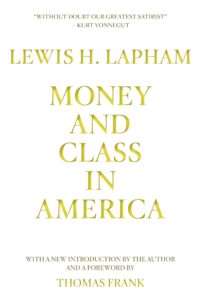
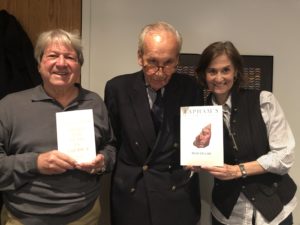
Money And Class In America – Lewis Lapham
We are especially pleased and honored to spend the hour with our guest Lewis Lapham. After graduating from Yale in 1956 he started out working as a newspaper reporter in San Francisco and then in New York, where he currently lives and works. The editor of Harper’s Magazine for 20 years, Lapham has written 14 books. Currently, he edits “Lapham’s Quarterly.”
Lapham founded the quarterly magazine in an effort to further the consideration of history, which he calls “the advice and counsel of the past.” He sees history as “a guide to understanding and acting on the issues and ideas before us today.”
Major pillars of the rule of law have been defiled since 911. The edifice still stands, the promises remain, but as a nation, we have suffered huge losses. Last spring Lapham’s Quarterly addressed the topic, “The Rule of Law.” His 1988 book “Money and Class In America” was re-published by OR Books last year with a new introduction by Lapham and a forward by Thomas Frank. We speak with him in our studio today about the contradiction between the rule of the monied rich and the rule of law.
Guest – Lewis Lapham is editor and founder of Lapham’s Quarterlysince 2007 and editor of Harper’s Magazinefrom 1975 to 2006, Lewis H. Lapham is a member of the American Society of Magazine Editors Hall of Fame. He is the author of fourteen books, among them Money and Class in America, The Wish for Kings,Waiting for the Barbarians, Theater of War, and Age of Folly. He produced a weekly podcast,The World in Time, for Bloomberg News from 2011 through 2013. His documentary filmThe American Ruling Class has become part of the curriculum in many of the nation’s schools and colleges. A member of the Council on Foreign Relations in New York, Lapham has lectured at Yale, Princeton, Dartmouth, Stanford, the University of Michigan, and the University of Minnesota.






















